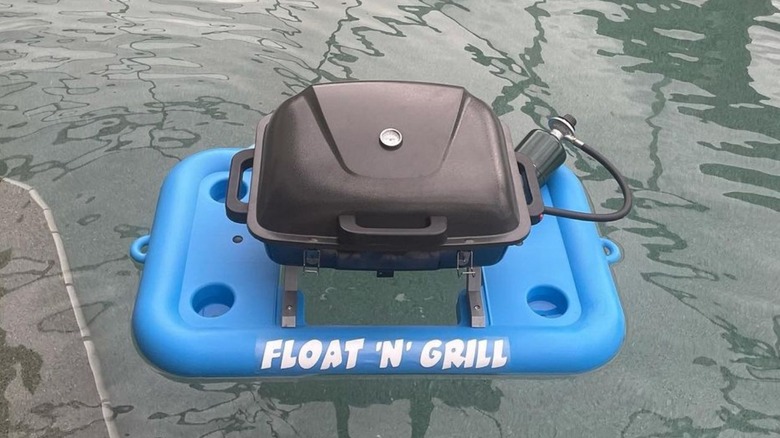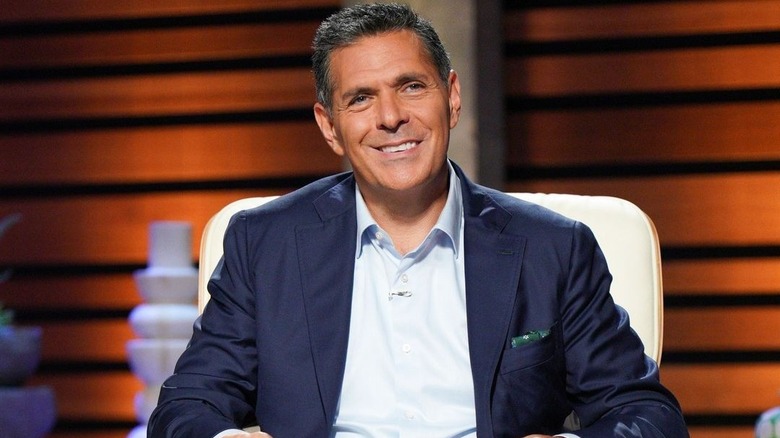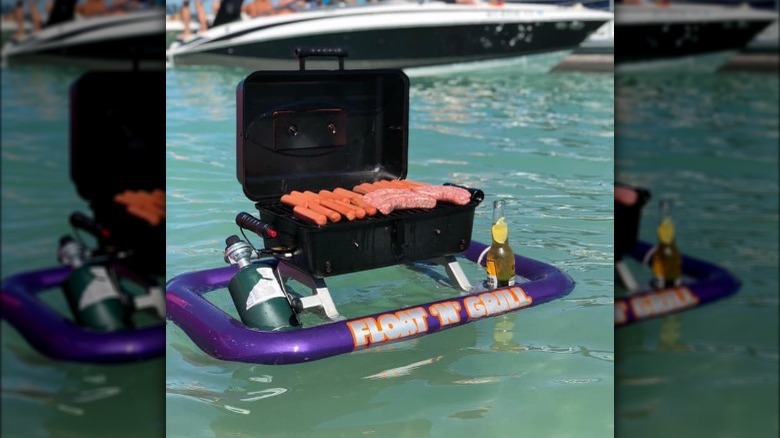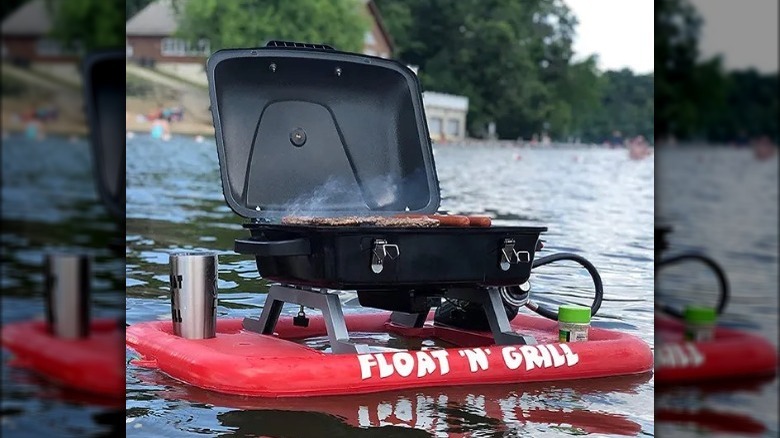Float 'N' Grill: Here's What Happened After Shark Tank
Everything about Float 'N' Grill screams fun in the sun, so much so that in 2022, "Shark Tank" named it one of the top three pitches to get you ready for summer. The design offers a floating grill that can easily cook cheeseburgers and hot dogs during hot summer days when you're literally on the water. With a smart solution for cooking in an unexpected place, the possibilities seemed endless for preparing unexpected foods on the grill for any occasion. It was the idea of entrepreneurs Mike Bashawaty and Jeremy Quillico, who both hail from Plymouth, Michigan.
They first came up with the concept in 2018, and after a Facebook post showing a prototype went viral, they garnered nearly 5 million views in only three days. But, at the time, the business partners hadn't yet found a manufacturer to help them build it, so the company didn't get off the ground until more than a year later. In fact, by the time their product pitch aired during Season 12, Episode 24 of "Shark Tank" in May 2021, Float 'N' Grill had only been available as a product for 18 months and had managed a meager $19,400 in sales to date.
The sales numbers were a point of contention for the sharks, although none could deny the ingenuity of the water grill that has space for cooking up to eight burgers, is mounted on food-safe HDPE plastic, and only requires a 1-pound propane grill.
What happened to Float 'N' Grill on 'Shark Tank'?
Float 'N' Grill founders Mike Bashawaty and Jeremy Quillico went on "Shark Tank" in 2021 asking the investors for $200,000 for 20% equity, based on a $1 million valuation and the fact they had acquired a patent for their device. The sharks on this episode — Mark Cuban, Lori Greiner, Kevin O'Leary, Daniel Lubetsky, and Robert Herjavec — were largely disparaging based on the sales numbers. O'Leary, notably, told the two Float 'N' Grill entrepreneurs that "the sandbar community has rejected you!"
The high price for the product ($229 suggested retail) was also mentioned as an issue, with Cuban noting that the duo's sales figures indicated they'd sold less than 100 units to date. Cuban and O'Leary had little interest in the product and failed to make an offer; Greiner also passed, and so did Herjavec, citing the disconnect between sales and the $1 million business valuation.
The one shark with interest in Float 'N' Grill was Kind Bar founder and billionaire Lubetsky, who told the two entrepreneurs that he had a relationship with the owners of Weber Grills, and thus was willing to make an offer based on a potential licensing agreement. His initial offer was $200,000 for 50% equity, which didn't sit well with Bashawaty and Quillico due to the equity already provided to other investors. Lubetsky's final proposal was $100,000 for a 22.5% stake, a $100,000 loan, and 50% of any licensing agreements. Bashawaty and Quillico said yes, and a deal was made.
Float 'N' Grill before and after 'Shark Tank'
Float 'N' Grill's business journey is a fascinating one. The original idea for a floating grill occurred to co-founder Mike Bashawaty after he bought a 16-foot jet boat in 2015. He later met Jeremy Quillico and shared the idea, leading the latter to start patent research, with the first launch of the product coming at the Detroit Boat Show in 2019. The "Shark Tank" appearance followed in 2021, but that wasn't the first time the two tried to get on the show.
In an interview with Hometown Life in February 2019, Bashawaty noted that he and Quillico had already auditioned for "Shark Tank" that year, before falling short in the final round. "They would've wanted 50% of the company for like, maybe $100,000," he told the publication. "We were pretty blessed with the investors that we got." Though, they clearly changed their stance as they eventually did try out, and were accepted, for the show two years later.
The "Shark Tank" appearance seemed to mark a turning point for Float 'N' Grill, as within a month of the show's air date, they were not only selling their buoyant grills on an official website but were also selling them online via Amazon.
Is Float 'N' Grill still in business?
Float 'N' Grill's current status is a bit complicated. The product is no longer available on Amazon, nor on the Float 'N' Grill website, which has since shut down. Co-founder Jeremy Quillico's LinkedIn profile indicates that he's still involved with the company, but that the business, for all intents and purposes, has ceased to exist. It seemed there was no time to test if go-to tips ensuring burgers don't fall apart on the grill would translate to a pool or open water setting.
So what happened to Float 'N' Grill on the heels of their successful "Shark Tank" appearance, when billionaire shark Daniel Lubetsky invested in their company, and had high hopes for licensing the product with Weber Grills? Everything initially appeared on track. In May 2021, just before the episode aired, co-founder Mike Bashawaty told the Detroit Free Press: "We are in the works with a major company that deals with grilling and I will leave it at that."
The company remained on track for success even going into 2023. But now the company has vanished from the web with its shopping portal gone as well as its social media accounts. The reason for this sudden disappearance appears to be related to the patent.
What's next for Float 'N' Grill?
Co-founder Jeremy Quillico handled the original patent work for Float 'N' Grill, while his colleague Mike Bashawaty was responsible for the design of the floating grill. Both of them were referenced in a recent decision by the U.S. Court of Appeals for the Federal Circuit. As The National Law Review reported on July 20, 2023, this court has denied Float 'N' Grill's request for a reissued patent. The original patent issued to the company was for a very specific design, one in which multiple magnets were used to connect the grill to its plastic float. According to U.S. law, any reissue claims must be based on the original patent, and that's a standard that Float 'N' Grill apparently has failed to meet in 2023.
Float 'N' Grill, in its attempt to amend its original patent, referred to the magnets as "non-essential embodiments." The court obviously disagreed. What this means is that, if Float 'N' Grill has changed the original design for their product, that change is not covered under their existing patent. This could explain why the product is no longer available for purchase, since, if the grill had been redesigned without magnets, it would no longer have any legal protection. It could also explain why no licensing agreements were ever reached that could've furthered the company.
In the future, the court's decision won't stop Float 'N' Grill from reintroducing a product that meets its original patent design, but if the company no longer wants to use this design, then it's left in legal limbo.





